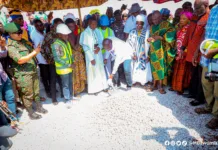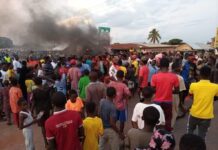
A multi-stakeholder forum of the Ghana Integrity Initiative on its Land and Corruption in Africa (LCA) project turned into an arena for settling simmering tensions over land use and ownership in the Ejura Sekyedumase Municipality as residents and the traditional authority haggled freely over nagging land issues.
Vast tracks of farmland in Ejura have become the main source of tubers, legumes, and grains feeding major markets across the country.
Beyond the cultivation of these farmlands, however; land ownership and use especially for settler farmers who migrated from Northern Ghana to rent lands, is a major concern.
The tenant farmers are constantly confronted with what they call unfair seizure of farms by allodial owners and investors acquiring large tracts of land from chiefs.

These unfair land practices that have lent themselves to corruption and loss of livelihoods drew heated arguments when the Ghana Integrity Initiative, afforded farmers a window to share their concerns after schooling them thoroughly on the tenets of Ghana’s Land Act, 2020 (Act 1036).
Community and Farmers Complain
While some residents complained about the double sale of lands, others were angered that their lands had been retaken for town expansion and real estate development.
A woman who gave her name as Yaa Agyeapongmaa fumed, “You can cultivate a whole land only to have someone come to claim the land during harvest. If you move to hire another land, you might not make any yield.
A farmer who was angered by the land guard menace argued, “I think the focus should be on the chiefs. Land guards will have no job if the land is sold to one person.
A resident whose land had been taken over by another claimant disclosed, “Some people are holding receipts and site plans claiming to own lands. One of them has built a house on land I bought and has the rightful title to”.
Some other residents were curious how some chiefs would quickly call land owners for renegotiation of terms when there was an unfortunate accident which meant that the buildings be pulled down for reconstruction.
Chiefs Respond
The chiefs parried the claims even though many fingers pointed at them for their alleged involvement in inequitable land administration practices.
Responding to the claims, Odikro for Ohea Mpe Anika, Nana Kofi Wusu told GHONE News that the Chiefs have duly compensated anyone whose lands have been taken for developmental purposes or sold to large-scale land investors.
He explained, “Most Ejura Lands were rented to our Northern Settlers. The fact that their forebears handed it down to them does not mean the lands are theirs so the chiefs still have a say.
“If development catches up with your lands, the chiefs always compensate them. We ensure that they get a part of the land for their use,” he contended.
Position of Law
Ghana’s Land Act 1036 lays down clear guidelines for large-scale acquisition of lands and due compensations to persons whose lands are taken either by the state or other vested allodial owners of lands.
Lands Officer with the Ashanti Regional Lands Commission; Bismarck Oppong Kisi pointed out that such controversies would not arise if the act were properly applied.
“The law emphatically states that when development catches up with your farmlands, the chief is supposed to compensate you with 40% of whatever accrues from the proceeds of the value. It can be offered either in land or in monetary compensation,” he pointed out.
LCA and ALAC
Anti-Corruption Body, the Ghana Integrity Initiative is holding these interactions as part of its Land and Corruption in Africa project being held concurrently by Transparency International in eight African Countries.
Programs Manager of the Ghana Integrity Initiative Michael Okai gave assurances, that beyond the education of residents on the proper use of the land act, it has made available an Advocacy and Legal Advice Centre to support aggrieved parties to seek redress.
“These are farming communities that need resolution to their land issues and the Advocacy and Legal Advice Centre has the best approaches that can help the community members either as witnesses or victims, to make complaints and seek redress.”
“Since the new land act makes preference for Alternative Dispute Resolution, we believe upscaling the ALAC to at least every region of the country will support in that regard,” Michael Okai assured.
The community members were further taken through the requirements of the Land Act as regards processes for properly executing large land use purchases and how communities should be engaged and affected community members properly compensated.
The project funded by BMZ is aimed at ensuring transparency and inclusivity in land administration; helping mistreated victims to seek redress and equipping all parties in land administration with the knowledge to perform their roles responsibly and support vulnerable populations to demand their rights as stipulated in Ghana’s Land Act, 2020 (Act 1036).
Source: Ghana/Starrfm.com.gh/103.5FM/Ivan Heathcote – Fumador




